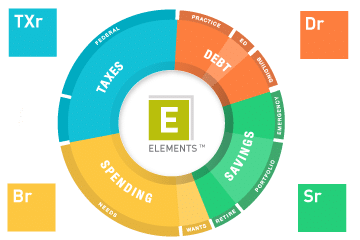Tracking spending is an essential activity for good personal financial planning. Here’s why it is so important that it gets done.
Tracking your spending helps to ensure a strong financial future, so why do so many business owners and professionals avoid doing it correctly?
What I often see, is someone with a great income who seldom has to worry about seeing a bounced check. If the owner needs some cash, he takes a distribution. Because cash is accessible through the business quite easily, the owner may not feel the sting of an empty bank account, nor the sense of the urgency to monitor his personal spending.
Interestingly, empty bank accounts are one of the few obvious triggers that cause people to wonder whether they’re spending too much. This explains why lower / fixed income families tend to equate personal finances with budgeting and tracking their personal spending, whereas higher income / variable income individuals don’t rank this as a high priority.
Now, I’m not here to tell all of you to start pinching your pennies, albeit we could all use a reminder every now and then. The point I want to emphasize is that successful people must track their personal spending for this reason: if you don’t know what you spend, you don’t know when you can retire.
Nobody Wants to Downgrade Their Lifestyle
Statistically, most successful people want to maintain or increase their standard of living (i.e. lifestyle items) during retirement. These items include things like travel, dining, cars, vacations, housing and entertainment.
A few years back, I tried to sell (what I thought to be) an excellent Yamaha 88-key digital piano to an avid musician. I thought he’d be loading it in the back of his truck within seconds. But, after ten minutes of tickling the ivories, he looked up at me and explained that it was just too hard for him to settle for the weighted keys in my piano after he had become so accustomed to the new real-ivory touch that started to come out in newer models. I’ll admit, at the time I had no idea what I was missing out on, but we’ve all been in a similar situation. Nobody likes to downgrade.
The key to enjoying nice things during retirement is tracking your spending now so that you can make accurate projections of your future. This isn’t about cramping your lifestyle, it’s about being informed and making smart financial decisions today.
Predicting Your Standard Of Living During Retirement
The best way to track your spending is to average it out over several years. This gives you an extremely accurate lifestyle estimate that you can use for retirement planning. How much money would you ideally like to spend during retirement on, let’s say, vacations? You could wait until you’re 65 and then take a stab in the dark, but this won’t work. Guesses make big messes.
We need to start earlier in your life by tracking your personal spending in a painless and automated way. The great news is that you can find free personal finance tools like Mint.com or our free software, designed for client-advisor collaboration (EMoney Advisor), which makes the task easy, and avoids all of those pesky ads and spam emails.
If we track your spending over a period of 3 to 5 years, and categorize each expense in an organized way, then we’ll get a really good handle on your vacation preferences, food preferences, vehicle needs, etc. We’ll KNOW how you like to live, so we can be absolutely SURE that we’re improving, or at least maintaining, your standard of living when you retire.
Accurate Predictions Require Accurate Data
Two things can happen when we start making predictions. We either overestimate, in which case you work too hard for too long. Or, we underestimate, in which case you end up having your dream vacation at the Holiday Inn Express in Wendover, NV instead of the Burj Al Arab in Dubai.
Making an accurate prediction requires good data, and that’s where a financial advisor can really make a difference in securing your future. A simple miscalculation of $500 per month can affect your retirement projection by hundreds of thousands of dollars. A miscalculation of +/- a few thousand dollars per month (which is very common among business owners) can affect your retirement goals by millions.
Meet Jim Givitis & Orel Igene
I want to introduce you to a couple of fictional characters I’ve identified over the years. These fellas will give us a practical view at how two different people approach the same problem. Jim Givitis, our financially challenged friend (we’ll help him out, don’t worry) and Orel Igene who has great finances.
Mr. Givitis’ Philosophy
Jim has a loose family budget that he keeps in his head. Christmas, vacations, and charitable contributions don’t really count, because those things don’t happen all the time. He’s been able to get by for years using this philosophy and they’re doing just fine, so why go through the trouble of monitoring spending?
Jim isn’t accountable to anyone on a regular basis when it comes to monitoring spending, and financial essentials get overlooked as the good times roll. He’s preoccupied with the great lifestyle he has worked so hard to secure, but doesn’t have a strategy in place to secure his future.
He also feels overwhelmed by the comparisons he makes to others who have achieved more than him. He might say to himself, “Dr. Igene has a boat and goes on these incredible family vacations, so I’m going to do that as well. In fact, I’ll start by picking up that brand new model over at the dealer.”
Jim begins feeling exhausted by all the stress and anxiety that comes from business-ownership, debt and comparison. This is the moment when Jim begins to think along the lines of retirement, and he finally realizes that maybe it’s time to start having a conversation about when he’ll be able to retire successfully. He doesn’t really know where all his money is going, but he needs to figure it out if he’s going to start making progress.
Mr. Givitis’ Problem
To be fair, there is a little bit of Jim in all of us, which is why this message is so important. The truth is, the Givitis family doesn’t really know what they spend. They have a tendency to live in the present and base their budget (if they have one) on what they’ve been able to do in the past, and in the end, this makes it all but impossible to plan for retirement.
Mr. Igene’s Philosophy
Orel tracks his spending electronically so he doesn’t have to mess with a time-consuming, painful budgeting process. He has a financial advisor to help him get this all organized in an application that he can use on his phone and his computer. He’s less concerned about exactly where every penny is going, and more concerned that he’s tracking things in the right buckets.
He doesn’t have tons of tedious little budget categories that make things overwhelmingly difficult to manage. Instead, he just lets his computer keep track of the big picture items like vacations & entertainment, food & dining, utilities, insurance, and everything else.
He keeps track of everything so he has a total spending number he can review each month by checking his smartphone. He’s able to quickly look at his personal spending trends over the past several years so he can average in the large vacations, charitable expenses and holidays. He knows that these big expenses are part of his spending and understands what a comfortable lifestyle feels like so he can plan for that.
Mr. Igene’s Payoff
Because Orel monitors his spending, he is confident that his retirement projections are accurate and stable. This gives him mental peace and helps him make decisions during his career that are in the best interest of himself and his family. Moreover, he’s excited. He’s excited to hit a point when he can enjoy an even better lifestyle, without working 40+ hours a week.
Tracking your spending doesn’t have to be a tedious, painful chore. Once you get it down, it’s actually kind of fun. It gives you clarity that you didn’t have before, and motivates you to achieve a few more wealth accumulation milestones as you begin to clearly envision your nest egg. In the end, it’s simply one of the most essential activities of personal financial planning, and it’s just something that needs to get done.




